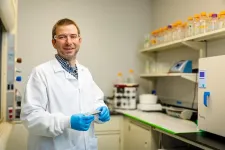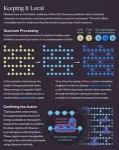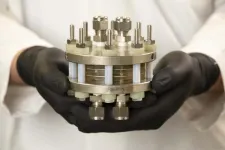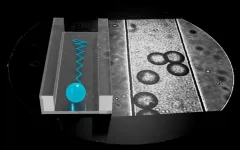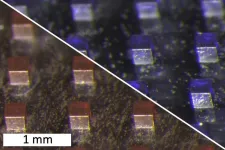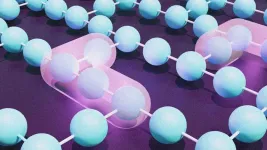(Press-News.org) The U.S. Department of Defense awarded just under $514,000 to an interdisciplinary team of researchers at the U of A to study the efficacy of “self-delivering” gene editors in the treatment of Duchenne Muscular Dystrophy, or DMD.
DMD results from a mutation in the dystrophin gene and is one of the most severe inherited muscular dystrophies, leading to deterioration of the muscle fibers. Presently, there is no cure, but advances in treatment have helped patients live longer, better lives.
Gene therapy designed to supply replacement genes to skeletal muscles may hold the key to a cure. Current treatment techniques favor a viral delivery of replacement genes, through what’s known as an adeno associated virus, to targeted skeletal muscles. But there are still many unknowns with this form of treatment, including how long a given gene replacement therapy will last, whether the body will counteract the therapy through a strong immune response and whether the gene therapy will result in unintentional genomic changes, which can trigger undesirable side effects.
The researchers will explore non-viral options for delivering gene therapy to potential DMD patients, specifically “self-delivering” gene editors. They are self-delivering in that they would move through the bloodstream into muscle tissues through a process called endothelial transcytosis, rather than using a viral delivery system.
Initial testing will be done through microphysiological systems known as organs-on-chips that can model the endothelial barrier. Endothelial cells line blood vessels and regulate the movement of materials between blood vessels and surrounding tissues. The researchers will study both skeletal muscles cells and muscle stem cells that are responsible for rebuilding muscle.
They hope to identify the best gene editors in terms of safety and efficacy, ideally allowing a wider pool of patients to access these innovative new gene therapies.
Chris Nelson, an assistant professor of biomedical engineering, will be the principal investigator. Nelson’s lab specializes in developing biologically inspired strategies for controlled drug and gene delivery for gene therapy and regenerative medicine.
Nelson noted that “this project is the result of an exciting collaboration between multiple fields of research.”
This includes Kartik Balachandran, a professor of biomedical engineering, serving as a co-principal investigator. Balachandran specializes in the creation of organs-on-chips — 3D organ constructs engineered from human cells and tissues that mimic critical human functions. Joining them is Kevin Murach, an assistant professor in the Health, Human Performance and Recreation Department, who specializes in the study of skeletal muscle mass regulation, as an additional co-PI.
Nelson noted that Shilpi Agrawal, a postdoctoral researcher in his lab, made important contributions to drafting the award proposal and collecting preliminary data. This is Nelson’s second major grant in recent months, complementing a recent $1.8 million award from the National Institutes of Health.
END
Department of Defense funds study of gene therapy for muscular degeneration
The $514,000 DOD award will be used to study the efficacy of gene editors in the treatment of Duchenne Muscular Dystrophy
2024-10-29
ELSE PRESS RELEASES FROM THIS DATE:
People’s exposure to toxic chemicals declined in the U.S. following listing under California law
2024-10-29
With growing concern about the ubiquity of toxic chemicals in consumer products, many states have passed laws aimed at protecting people from harmful substances in everyday items like cosmetics, cleaning supplies, plastics, and food packaging. California’s Proposition 65, for instance, is considered one of the most extensive toxics laws in the country.
But does the law work? According to a new study published in the journal Environmental Health Perspectives, it does.
“Not only have people’s exposures to specific toxic chemicals gone down in California, ...
Trauma, homelessness afflict gender affirming care patients at higher rates
2024-10-29
A survey of patients receiving gender affirming care shows that commercial insurance pays for most of their treatments, they receive less care in the South than other parts of the U.S. and they deal with disproportionate levels of housing insecurity and trauma compared to others, according to a new study by researchers at the Colorado School of Public Health and the University of Colorado Anschutz Medical Campus.
The study, using data provided by Kythera Labs, a healthcare clearinghouse, examined millions of insurance claims by patients undergoing gender affirming care (GA) and those not. It also looked at social determinants of healthcare (SDOH), non-medical factors ...
New $5 million DoE award supports KU startup’s green hydrogen energy research
2024-10-29
LAWRENCE — With $5 million in support from the U.S. Department of Energy, the University of Kansas and Avium — a startup firm founded by researchers from KU’s School of Engineering — aim to make clean hydrogen more affordable.
According to the DoE, the work at KU is part of $750 million in funding for 52 projects across 24 states “to dramatically reduce the cost of clean hydrogen and reinforce American leadership in the growing hydrogen industry.”
Green hydrogen is a key tool in the worldwide ...
A navigation system for microswimmers
2024-10-29
Microswimmers often need to independently navigate narrow environments like microchannels through porous media or blood vessels. The swimmers can be of biological origin, like algae or bacteria, but also constitute custom designed structures used for the transport of chemicals and drugs. In these cases, it is important to control how they swim in relation to walls and boundaries - as one might want them to exchange fuel or information, but also avoid them to stick where they are not supposed to.
Many swimmers are electrically ...
Study finds early TAVR can be beneficial for patients with asymptomatic severe aortic stenosis
2024-10-29
WASHINGTON, DC – OCTOBER 28, 2024 – The first powered randomized trial examining early intervention with transcatheter aortic valve replacement (TAVR) in patients with asymptomatic, severe aortic stenosis (AS) found this strategy to be both a safe and effective alternative to clinical surveillance (CS).
Findings were reported today at TCT 2024, the annual scientific symposium of the Cardiovascular Research Foundation (CRF). TCT is the world’s premier educational meeting specializing in interventional ...
Implantable microparticles can deliver two cancer therapies at once
2024-10-29
Patients with late-stage cancer often have to endure multiple rounds of different types of treatment, which can cause unwanted side effects and may not always help.
In hopes of expanding the treatment options for those patients, MIT researchers have designed tiny particles that can be implanted at a tumor site, where they deliver two types of therapy: heat and chemotherapy.
This approach could avoid the side effects that often occur when chemotherapy is given intravenously, and the synergistic effect of the two therapies ...
Early intervention in patients with asymptomatic severe aortic stenosis and myocardial fibrosis falls short of expected benefits
2024-10-29
WASHINGTON, DC – OCTOBER 28, 2024 – The EVOLVED trial found that early aortic valve intervention in patients with asymptomatic severe aortic stenosis (AS) and mid-wall myocardial fibrosis on magnetic resonance imaging did not reduce the incidence of the composite primary endpoint of all-cause death or unplanned aortic stenosis hospitalization compared with guideline-directed conservative management.
Findings were reported today at TCT 2024, the annual scientific symposium of the Cardiovascular Research Foundation (CRF). TCT is the world’s premier educational meeting specializing in interventional cardiovascular ...
The surprising reason a classical computer beat a quantum computer at its own game
2024-10-29
Earlier this year, researchers at the Flatiron Institute’s Center for Computational Quantum Physics (CCQ) announced that they had successfully used a classical computer and sophisticated mathematical models to thoroughly outperform a quantum computer at a task that some thought only quantum computers could solve.
Now, those researchers have determined why they were able to trounce the quantum computer at its own game. Their answer, presented on October 29 in Physical Review Letters, reveals that the quantum problem they tackled — involving ...
Researchers Aim To Get Leg Up on Bone Repair with 3D-Printed Femur
2024-10-29
University of Texas at Dallas mechanical engineers have designed a 3D-printed femur that could help doctors prepare for surgeries to repair bones and develop treatments for bone tumors.
The engineers, who worked in collaboration with UT Southwestern Medical Center orthopedic surgeons, published their first study on the 3D-printed thigh bone online Aug. 5 in the Journal of Orthopaedic Research.
The study, which focused on the middle section of the bone, establishes 3D-printing parameters for a femur for use in biomechanical testing. Researchers said more studies will be needed before the technology could be available for widespread use.
To study and validate innovative surgical implants ...
Transforming patient care: study finds bedside interdisciplinary rounds boost satisfaction for patients and providers
2024-10-29
A study led by researchers at the University of Colorado Anschutz Medical Campus reveals patients and providers have more positive overall care experiences when the entire healthcare team is a part of bedside interdisciplinary rounds (BIDR).
The study published today in the Journal of General Internal Medicine.
The study found that BIDR, when the team meets at a patients’ bedside in the hospital to discuss care plans, helps build trust between patients and their healthcare providers and within healthcare teams by allowing everyone to observe and work together more closely.
“Traditional ...
LAST 30 PRESS RELEASES:
Fossil amber reveals the secret lives of Cretaceous ants
Predicting extreme rainfall through novel spatial modeling
The Lancet: First-ever in-utero stem cell therapy for fetal spina bifida repair is safe, study finds
Nanoplastics can interact with Salmonella to affect food safety, study shows
Eric Moore, M.D., elected to Mayo Clinic Board of Trustees
NYU named “research powerhouse” in new analysis
New polymer materials may offer breakthrough solution for hard-to-remove PFAS in water
Biochar can either curb or boost greenhouse gas emissions depending on soil conditions, new study finds
Nanobiochar emerges as a next generation solution for cleaner water, healthier soils, and resilient ecosystems
Study finds more parents saying ‘No’ to vitamin K, putting babies’ brains at risk
Scientists develop new gut health measure that tracks disease
Rice gene discovery could cut fertiliser use while protecting yields
Jumping ‘DNA parasites’ linked to early stages of tumour formation
Ultra-sensitive CAR T cells provide potential strategy to treat solid tumors
Early Neanderthal-Human interbreeding was strongly sex biased
North American bird declines are widespread and accelerating in agricultural hotspots
Researchers recommend strategies for improved genetic privacy legislation
How birds achieve sweet success
More sensitive cell therapy may be a HIT against solid cancers
Scientists map how aging reshapes cells across the entire mammalian body
Hotspots of accelerated bird decline linked to agricultural activity
How ancient attraction shaped the human genome
NJIT faculty named Senior Members of the National Academy of Inventors
App aids substance use recovery in vulnerable populations
College students nationwide received lifesaving education on sudden cardiac death
Oak Ridge National Laboratory launches the Next-Generation Data Centers Institute
Improved short-term sea level change predictions with better AI training
UAlbany researchers develop new laser technique to test mRNA-based therapeutics
New water-treatment system removes nitrogen, phosphorus from farm tile drainage
Major Canadian study finds strong link between cannabis, anxiety and depression
[Press-News.org] Department of Defense funds study of gene therapy for muscular degenerationThe $514,000 DOD award will be used to study the efficacy of gene editors in the treatment of Duchenne Muscular Dystrophy
